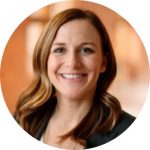WANT TO BE A NEW CHAPTER ALUMNI?
Apply online to share your accomplishments and endeavors.
APPLY TO BE FEATUREDApril 2017

Madison, Wisconsin
Assistant Professor of Kinesiology, University of Wisconsin-Madison
VIEW PROFILEJill Barnes, Ph.D. (ANES ’13), is an assistant professor of kinesiology at the University of Wisconsin-Madison and affiliate faculty member at the University of Wisconsin School of Medicine and Public Health. She completed a postdoctoral fellowship in human integrative physiology at Mayo Clinic School of Biomedical Sciences in 2013. She received the 2014 Edward C. Kendall Mayo Clinic Alumni Association Award for Meritorious Research for her work exploring the interactions of aging, sex differences and cerebral blood flow regulation in humans. Soon thereafter she left Mayo for a tenure-track faculty appointment at the University of Wisconsin-Madison.
I had to get used to being on a university campus again, with the undergrads and busy atmosphere of the campus. At Mayo, I could walk down a hallway to meet with a colleague. Here, I walk half a mile. It’s more difficult to connect with people.
A large university campus has a nice energy though. Many people here are interested in participating in research. Unfortunately, state budget cuts to research have affected my department, grant and hiring.
My lab includes three grad students, a research specialist and nine undergraduate students.
I like having my own lab and being able to hone in on what I’m most interested in and what my students are interested in.
On the other hand, being in charge means I have to find the resources such as funding and equipment to accomplish what I want. That requires me to be quite aggressive. I’ve given up competitive athletics so I can direct that energy on my work rather than recreation.
When I was at Mayo I received a National Institutes of Health career development award — a K99 award that follows me wherever I go, so I’m continuing that work. It focuses on cerebral blood flow and how it changes with age and exercise status. I’m working on another study of the sex differences in cerebral blood flow regulation.
A working hypothesis from our research is that people with higher fitness levels have enhanced blood flow to their brains, which increases attention span. We’re studying brain blood flow and altering it with chemical and cognitive challenges to see which areas receive greater flow and by how much. In people with Alzheimer’s disease, we see a very little response, which indicates significant damage to their blood vessels and inhibition of critical executive functioning. We hope one day to be able to identify the biomarkers in the body and brain that relate to the development of cognitive impairment. Then we could intervene, treat or prevent vascular dementia.
I also continue to collaborate with researchers at Mayo Clinic, including Virginia Miller, Ph.D. (PHYS ‘86), on sex differences research, and Michael Joyner, M.D. (ANES ’92).
The American College of Sports Medicine has a World Congress on Exercise is Medicine and World Congress on the Basic Science of Exercise and the Brain. This year it’s May 30-June 3 in Denver, Colorado. The events attract more than 6,000 people to the most comprehensive sports medicine and exercise science meeting in the world.
I was involved as a student but not as a professional. The Program Committee asked me to participate. My department offered some funding and help, so I got involved with this conference-within-the-larger conference. I’m organizing two days of programs around exercise and the brain. People who study exercise and the brain generally attend their own professional meetings. This is an interdisciplinary meeting appropriate for physiologists and neurologists. I’ve enjoyed interacting with people in different disciplines whose work I knew but who I didn’t know personally.
It’s kind of sad — I had such a great time training at Mayo.
It’s been easy to stay connected. I’m not that far away geographically. The first year I was here a lot of people on their way to Chicago or Milwaukee stopped to visit. A lot of us attend the same conferences, and Mayo people seek each other out. Sometimes we stay with each other or share hotel rooms.
People on campus here also contact me with research questions because they’ve seen my Mayo work. Others contact me because they have an ill family member and want to know how to access care at Mayo.
Wherever I go, people recognize the Mayo logo and name and ask about it.
I want to help them with that. My father died soon after I left Mayo. He had head and neck cancer and was treated at Mayo, so I got to know Mayo well from the patient’s perspective. For the first four months I was at UW, I flew back and forth between Madison and home to help care for my dad. My new department chair was understanding and flexible, which I appreciated.
If I can help others get the care they need at Mayo, I want to do that.
Recently Dr. Barnes returned to Mayo Clinic to help one of her UW graduate students who had been diagnosed with cancer and needed proton beam therapy. Read that story.
Apply online to share your accomplishments and endeavors.
APPLY TO BE FEATURED